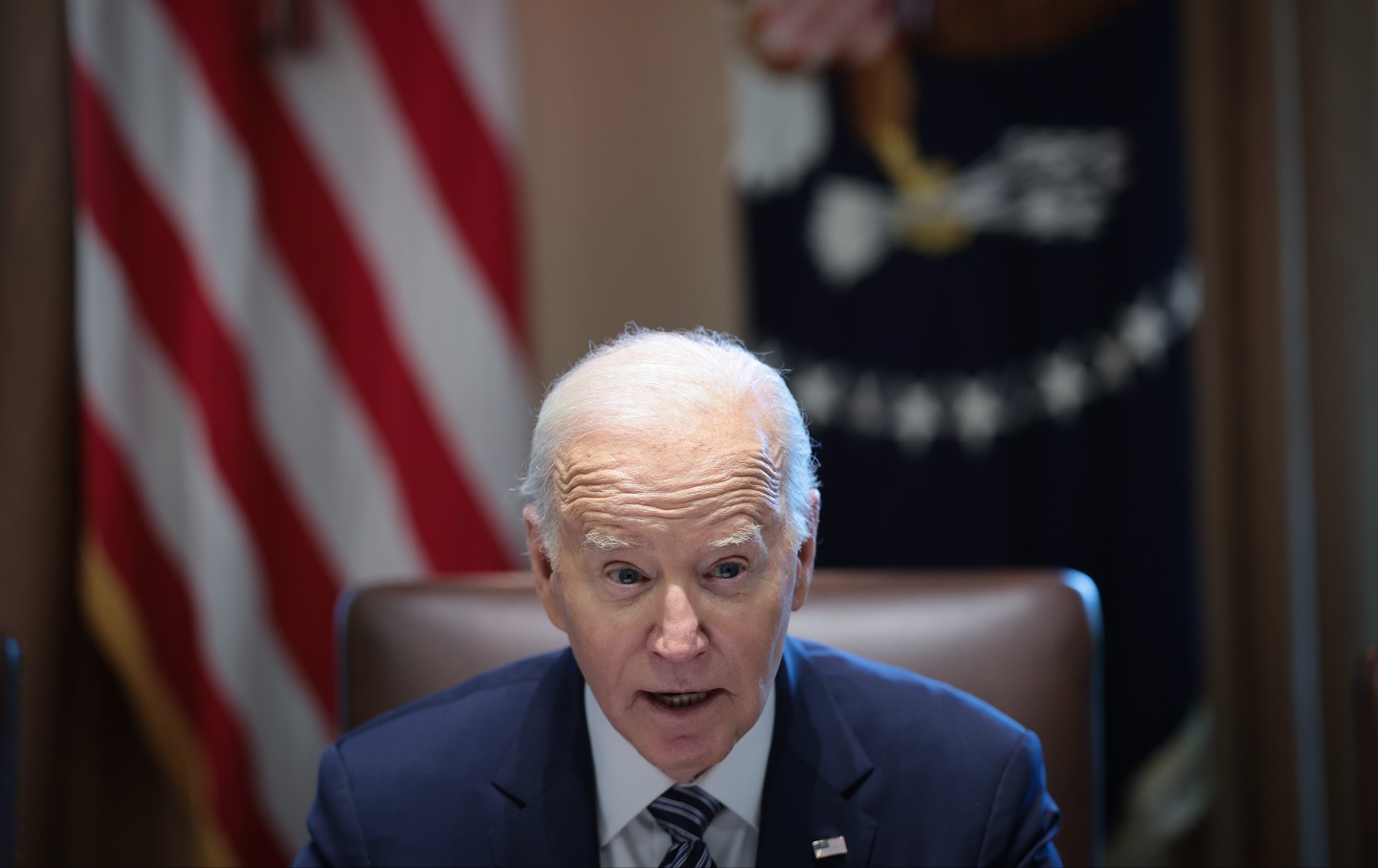
[ad_1]
Some observers say the war isn’t that big a deal in the 2024 campaign. Here’s why they’re so wrong.

The 2024 election continues to contradict itself as the primaries come to a close. On the one hand, polls in the race between Joe Biden and Donald Trump seem to point toward nothing less than a Republican revolution. For the past eight months, Trump has led continuously in national polling and in the decisive swing states—something that, if it holds, would give him an easy victory of more than 300 electoral votes and make him the first Republican to win the popular vote since George W. Bush in 2004.
But at the same time, as a recent New York Times poll shows, Democratic candidates for Senate have been holding solid leads in the exact same states, putting them on a path for a historic repudiation of the Republican Party in what was supposed to be an abysmal year.
So, with less than six months before election day, the predominant question of the campaign has become this: Why is Biden so uniquely unpopular compared to his party?
For many on the left, the answer is simple: Gaza. Among all of the members of his party, the president stands alone in the degree of his complicity in Israel’s morally indefensible and increasingly unpopular campaign. He has refused to meaningfully distance himself from the conflict even as the death toll has mounted to unimaginable highs and horrific accounts of Israeli abuse lead daily headlines. As the story goes, this has caused his support among young voters and voters of color—two core Democratic constituencies—to plummet far below both historic norms and the numbers managed by down-ballot Democrats, allowing Trump to pull ahead.
It all adds another degree of urgency to something people already wanted: an end to the war. Stop Netanyahu, it is said, and you will save not only countless lives but also a presidency—and, by extension, American democracy itself.
Some, however, have pushed back against this interpretation of the election. Pointing at issue polling showing that young voters and voters of color place a higher priority on domestic issues than on Israel, they argue that the idea that the Democratic base is abandoning Biden over his Gaza policies is more conjecture than proven fact. To them, the focus on Gaza as the source of the president’s woes is yet another example of an insular, over-educated leftist media clique mistaking the opinions of their friends for that of the country at large. To the extent that they acknowledge that the war is impacting the election at all, they say that Biden’s chosen course was the best one, politically speaking.
Current Issue

Which of these views is the most correct?
It depends on the question you’re asking. If you’re trying to determine how much the broad American public cares about the specifics of Biden’s Israel policy, you’ll probably side with the second camp. It’s undeniable that Israel policy doesn’t carry the same electoral weight as, say, immigration or the economy. That’s not too surprising; Americans only rarely place any foreign policy issues at the top of their agendas, and when they do, those issues almost always directly involve US troops.
Yet the larger claim from the “leftists are out of touch” camp—that Gaza has had a minimal effect on the election—could not be more wrong.
This may seem counterintuitive—how can an issue be a relatively minor concern for most people but still matter so much for November? To understand that, you need to relearn everything this set has told you about Biden’s unpopularity.
Ever since Biden announced his reelection bid a year ago, it has been taken for granted that his biggest struggle, above all else, is the economy. The press has oriented their coverage of the campaign around this theory. Biden’s campaign has oriented itself around it. Some of the most annoying debates in the history of online discourse have been based around this one, singular presumption.
But this presumption is wrong. The truth is that, as bad as some aspects of the economy have been under Biden and as much as people dislike his handling of it, it was not the reason why his approval first plummeted. It is not even close to his worst issue right now. The true culprit behind Biden’s struggles has been his foreign policy record.
It’s true. As strange as it is to think about, the Biden of his 2020 campaign and early presidency did have something of an aura about him: an idea of him as an elder statesman capable of managing America’s role in the world in a way that Trump never could. This conception defined every aspect of his public persona. It made him popular—more so than most of his party. It made him trustworthy. It arguably made him president.
That halo is long gone, and it wasn’t the economy that began to destroy it. It was the collapse of Afghanistan’s government in August 2021.
Ad Policy
Popular
“swipe left below to view more authors”Swipe →
As I put it in an article from April of last year arguing that Biden should not run for reelection:
It’s important not to understate the impact of [the Afghan government’s collapse]. It not only handed Biden the ignominious honor of presiding over the end of a lost war, but it shattered the very mystique that won him the Presidency in 2020: the idea of Biden as an experienced, competent statesman. He hasn’t been able to rebuild that mystique after a year and a half, and it’s very much worth considering that he may not be able to. It’s very hard to put that sort of genie back in the bottle.
In this light, the start of another massive foreign policy crisis was one of the worst things that could have ever happened to Biden in the run-up to his reelection. It reinforced the most damaging perceptions that voters have of him: that he’s out of it, in over his head, overtaken by events, and old. It is this aspect of Biden’s political persona that his team has completely dismissed to their peril. As sensitive as they are to every little way in which voters disapprove of his economic record, from the number of chips in Lays bags on down, they have been unbelievably blasé about the president’s weakness regarding foreign policy in general—which, if you believe polling, runs far deeper than almost any other issue—and Gaza in particular.
To call this a blind spot would be an understatement. The delusion has reached such extremes that the White House reportedly saw Gaza as an asset that would allow Biden to contrast himself favorably against Trump. Needless to say, it has not been that.
Voters are not looking at the war and seeing Biden as a strong, reliable figure whose manic support for Israel matches their supposed sympathies. They see an inept absentee president who has proven himself incapable of running the country, much less the world. And for every month that the conflict drags on and every billion-dollar check that is sent overseas, this perception hardens, convincing a small but meaningful number of voters that Biden, not Trump, is the more dangerous of two bad options.
It is for these reasons—reasons far deeper than the headline results of issue polling—that the Gaza war has been a complete political disaster for Biden. As much as his circle may scoff at the idea that people could see him as less reliable than Donald Trump, this perception is real, and it is sinking him. Assuming it is not already too late, the best thing that Biden could do, if not for the countless innocent lives at stake then at least for his own vain interests, would be to move heaven and earth to wind down the war as soon as possible. The way in which he does so won’t matter, at least not immediately. He just needs to do something, anything, to convince people that this country has a driver at the wheel, both on this issue and countless others. If he can’t, it might not matter what else he does between now and November.
Thank you for reading The Nation!
We hope you enjoyed the story you just read, just one of the many incisive, deeply reported articles we publish daily. Now more than ever, we need fearless journalism that moves the needle on important issues, uncovers malfeasance and corruption, and uplifts voices and perspectives that often go unheard in mainstream media.
Donate right now and help us hold the powerful accountable, shine a light on issues that would otherwise be swept under the rug, and build a more just and equitable future.
For nearly 160 years, The Nation has stood for truth, justice, and moral clarity. As a reader-supported publication, we are not beholden to the whims of advertisers or a corporate owner. But it does take financial resources to report on stories that may take weeks or months to investigate, thoroughly edit and fact-check articles, and get our stories to readers like you.
Donate today and stand with us for a better future. Thank you for being a supporter of independent journalism.
Thank you for your generosity.
More from The Nation

Maryland’s new Democratic US Senate nominee won a bitterly contested primary. Now, she has an even tougher fight on her hands.
John Nichols

Expecting voters to support the person with the power to stop the killing of their families, but who refuses to use it, is asking the impossible. This is about now, not November.
Phyllis Bennis

Trump’s former lawyer described in court how the former president demands total sycophancy from his underlings.
Chris Lehmann

Can a presidential candidate afford to lose gray matter to parasites?
Jeet Heer
[ad_2]